Paper Doll Interviews Life Coach, Author, and Kid-Schlepper Allison Task
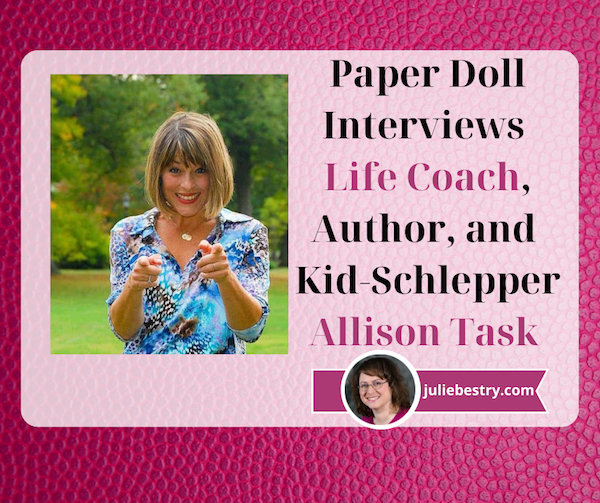
Paper Doll readers know it’s a rarity for me to do interview posts. I’ve saved this feature for special topics and colleagues, like Melissa Gratias, Leslie Josel, and that fun group of genealogy organizers, Janine Adams, Jennifer Lava, and Hazel Thornton.
Today, I want to introduce you to life coach Allison Task. You’ll hear how experiencing misogyny, learning psychology, the dot-com boom, culinary school, Martha Stewart, and de-prioritizing social media have helped her organize a life that allows her to support her clients, her readers, and her kids (who have a lot of their own adventures going on).
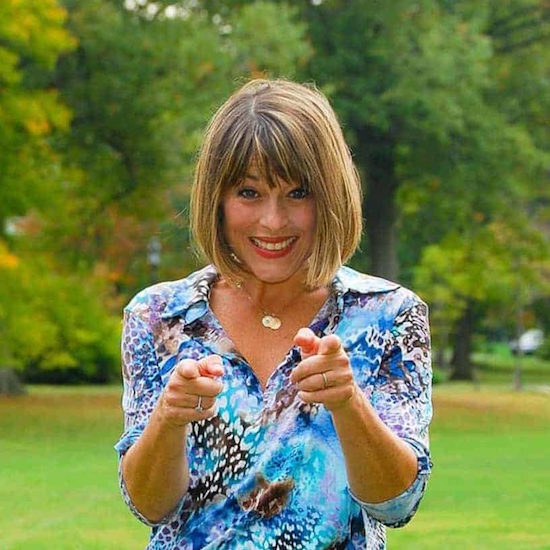
I’d like to say I knew a lot about Allison before she presented Let’s Make a Shidduch! How to Match Your Strengths to Client Needs and Do More of the Work You Love at NAPO2019 (especially as it turns out we went to the same college). But the shallow truth was, I picked her session because I was intrigued “shidduch” (Yiddish for “match,” as in matchmaking) and then was transfixed by the cool dress she wore during her presentation.
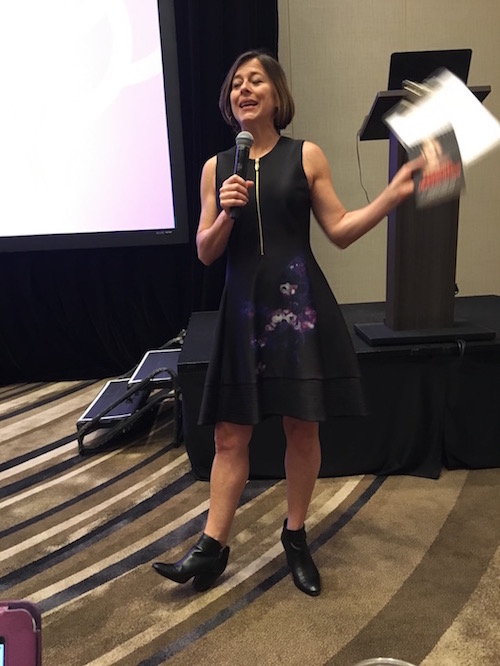
Had I known I’d be writing this post two and a half years later, I’d have been careful to take better photos! In my defense, Allison is such a high-energy presenter, there’s no way I could have caught her when she wasn’t in motion. So, I’m particularly excited that she was able to sit down for this fun interview about how she became the powerhouse life coach, speaker, and author she is today.
Allison, although we met at the NAPO Conference in Fort Worth, Texas, we *almost* could have met at college. I graduated from Cornell University in 1989, and you arrived just a little later, finishing in 1994. Mine was the decade of big hair and oversized sweaters; yours was the era of Beverly Hills, 90210 (the original!), babydoll dresses, and flannel shirts.
Could you tell Paper Doll readers about your early life and college years (when you majored in Human Development and Family Studies at Cornell, and later got a Masters in Science in Food and Nutrition from New York University)? What did you plan to do when you finished school?
But really, which one of us was Gear bags? Neon pinstripe jeans? NafNaf and ID#? I mean, Aqua Net belongs to the ages, but I am going to claim Sir Mix-A-Lots “I Like Big BUTTS” refrain as central to my college experience. Sigh. I just know I wore a lot of unitards and boot cut jeans under that flannel…
[Editor’s Note: As much as I love to link to pop culture videos, readers are just going to have to click through if they want to sing and dance along to Baby Got Back. It’s still a little spicy for an organizing blog!]
I think one thing that was key to college, or at least my interests during that time, was that I wanted to help people. And I was obsessed with how we think, why we think, and how we make the choices we make. Growing up as a girl on Long Island in the 80s, my experience was that we were coached to be lemmings — go to the mall, get your face on, and attract a male.
I really felt like my experience as a smart girl in the 80s was [being told] to tone it down, diminish the smarts so you didn’t alienate the boys. Your value is the boy you attract. I repeat, your value is the boy you attract. So I read the magazines and did the things to be, well…visions of Cherry Pie and Aerosmith videos. I think of the 80s hypersexualized women and girls, and those were the messages I received about women’s and girls’ worth.
At college, there was a refrain that we were the “ugliest girls in the Ivies.” [Editor’s note: Not Allison or I, personally. Just to be clear. We were stunning!]
And we heard that “smart girls are, obviously, dogs.” I remember the word dogs being used instead of women. So, I have a bit of baggage. When Supreme Court Justice Brett Kavanaugh’s hearings were going on, I watched every one. My phone line was lit up with friends at Yale who went there when he did. Those stories about high school parties and bad behavior led to similar in college. Similar but worse. And my college experience was full of experiences like those that Dr. Christine Blasey Ford revealed. Both experientially, and watching very drunk girls get carried away into rooms for terrible abuse. I saw and experienced things I wish I didn’t, and got both campus police and [the campus newspaper] involved. Let’s just say the male authorities didn’t want to touch any of that stuff.
It’s a different time today and I’m grateful for it. But it’s hard not to remember college without those experiences pushing to the fore.
I went to school because I wanted to learn more about people and how they think. Thus, Human Development. As I saw it, after I received my degree, I could go into marketing or social work. Since social work required more schooling, and seemed a bit grim and underpaid from the stories I heard from HDFS grads, I pursued marketing.
And media. In fact, my first job after college was a paid internship with WNET (Channel 13) in NYC. I was to research a documentary about celebrating the differences between the sexes. Gosh, flash forward to years later and this would be a totally different subject!
On Day 1, the funding fell through and I was researching a documentary on Hoboken. After the award-winning producer brought me to his apartment in Hoboken a few times and made me feel horribly uncomfortable (Picking up on a theme here? I hope so!), I quit and waitressed at my local pasta joint. What a summer!
Yikes! So what then?
Then I got a job as a CD-ROM CEO’s secretary, and had the job of researching how they could build a web site.
This is how my career launched. A year later, I was working at an Internet startup, and a year after that was recruited by CNET in San Francisco to join their team. A year after that, I was working for another startup and my starting salary was more than my mother’s final salary before she retired as a principal. I share that to let you know what a head trip this all was — I was three years out of school with a Human Development degree making more than my mother did as a principal in the highest paying district in New York state. Bananas!
I worked at dot coms for the better part of 10 years. I had a front row seat to the internet revolution in the nineties and aughts and it was a blast. I had the most exhilarating conversations about what we can build, and work and life happily blurred. The conversations I had about possibility, and what might happen (“Imagine, some day we will do holiday shopping online! Really, we will!”), dodging the naysayers, believing and building — all set the groundwork for the kind of creatively inspired conversations I have with my clients every day as a coach.
I eventually left dot coms and went to culinary school. After ten years of digital, moving from NY to SF and back again, I was ready for something more tangible and tactile. It’s no mistake that the maker movement has come in concert with the rise of digitalization — they are yin and yang, and I needed more yang.
Also, the B-school folk rushed into the dot-com world and made it all about bottom lines. There was more than enough money for everyone, but the obsessive focus on “exploiting the market” turned me off and felt grotesque. When we moved from the creative question of “what can we build” to “how much money can we make” I got bored and went to share my talents elsewhere.
(The Food Science Masters at NYU happened in my late 30s and was more for fun than a direct part of my career path.)
OK, so basically, you did the dot.com thing until late-stage capitalism turned the joy of creation into something unpalatable, then went to culinary school where everything was (hopefully) palatable! And (like me, before I was Paper Doll) you spent time in the television industry. The word is that you even worked with THE Martha Stewart!
All true! When I went to culinary school, I had a specific goal: I wanted to help people learn to cook at home. We grew up with the first generation of working moms and microwave dinner. I wanted to return the skill of home cooking to full time workers, and make it fun and easy. But not microwave easy, 20-30 minute puttanesca easy. I had put on some weight eating out all the time when I was dot-comming, but more importantly, I couldn’t hard boil an egg. I wanted to learn and I wanted to teach.
And the best home cooking teacher at the time, or at least the most visible, was Martha Stewart. And I needed to work for her. So I pursued and pursued until I had the opportunity. I was part of the launch team for Everyday Food, and eventually ended up as a culinary producer for her TV show.
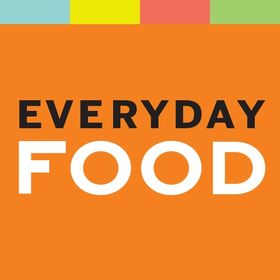
I learned more there than I had hoped — and was able to work directly with Martha. Presenting a TV segment to her is like defending a thesis. You have to think through everything. It raised my standards in the highest possible way.
While there, Martha was under investigation (and I left when she was sentenced to prison). As a result, the company was looking for talent inside the organization. I was asked to audition for a TV show, and ended up testing really well. (I was told I got very high “Q” ratings.) [Editor’s Note: Q scores measure familiarity and appeal of personalities and brands.)
So they media-trained me and gave me an opportunity to be part of the Everyday Food TV show on…PBS! Channel 13! Ah the irony of returning to that place of abuse as TALENT!
That was my first TV opportunity and it was a blast. Pure fun. After that I had opportunities to host shows on TLC, Lifetime, and Yahoo. An early producer gave me the advice, “Don’t count on this as a career, just have fun with it as long as you can.” I did and it was a blast.
How did these experiences prepare you for a career as a life coach, speaker, and published author? (And anything you want to say about Martha?)
Martha is great. She is endlessly curious and pursues those curiosities with vigor. I admire her tremendously.
I had twists and turns in my career. I knew what I wanted to do — help people, understand why they do what they do, and help them do the things they want / that benefit them. As a dot-com marketer, I helped explain what the internet could be. I helped people open their minds to the possibility of creating businesses online. It’s a leap of faith to show people the future, and to help them dream in this new environment.
That’s exactly what I do as a coach!
I get it! That’s what we do as professional organizers!
When the dot com became too exploitative or materialistic, I was turned off and looked for different work.
Working on TV helped me understand mechanics of communication — how I could interact with people to produce an emotion, and how sometimes helping people have a good cry could be beneficial to them. I learned how to connect with guests on my shows to set them at ease (while cameras were rolling), and build trust. These are absolutely skills I use with clients today (without cameras).
I trained as an early dot-commer to imagine the possible, and I trained as an on-camera host to build relationships with guests on the show and with my audience.
Working as an author I tried to share my personality / point of view to entertain and educate.
I was never very good at or interested in social media and all the self promotion (or all the hours of liking and engagement that it requires). I sidelined myself from media work when that all got big, in part because I had three kids in a little less than 1-1/2 years and I wanted to put my focus on them, not Facebook or Instagram.
This hurt me, I’m sure, in terms of my public image, but I’m quite happy about the connection I have with my kids and our light media engagement. I made the better choice personally, and it’s part of why my public image is rather quiet.
What would you say was the turning point that helped you identify your true calling and fine-tune what you do professionally?
So many moments! Here are three key ones:
- When I became a paper millionaire at my dot com at 26, I decided that was enough money to not have to work again. I wanted to live light, and I could live off the investment (not touching the principal). This opened the question of what work I would do if I didn’t have to work, which led me to helping people, helping their physical health, which led to cooking.
- Getting that Q rating at Martha developed my confidence that “people liked me, they really liked me,” and if I was true to my personality, that could resonate in the market place. I didn’t have to Aqua-Net my way into the favor of the public, I just had to reveal who I actually was. That was the special sauce!
- I was on the back of my boyfriend’s Triumph, tooling around NYC, and stopped near NYU to get some noodles. I picked up a copy of the NYU Steinhardt course catalog and saw the program for coaching. Lightning bolt moment — I could help people raise their game, work better than they are currently doing, enjoy life more. Sign. Me. The. Hell. Up! It was so clear that I had to do this, like the tide lifted me and I had to do it.
What do you love about the coaching experience? What are some things that have surprised you about coaching?
I love my clients. I love their bravery and courage to ask for more in their lives. I love our relationship, how we create a sense of trust and how I help them do what they know they want to do! I like supporting others to their own personal greatness.
I do get sad, sometimes, at the distance that is created culturally that we get so far from our own voice, that we stop listening to ourselves. I love the repair that can happen inside a person — that they can start to believe in and trust themselves again.
I love listening to another person really deeply so that they can better listen to themselves.
I like laughing and having fun with a client. There’s a big range of emotions — fear, sadness, hope, pain, joy…it’s powerful.
Writing is obviously a passion for you. Even before you were a coach, you made a name for yourself in writing cookbooks. There’s You Can Trust a Skinny Cook (as Allison Fishman) and Cooking Light’s Lighten Up, America!: Favorite American Foods Made Guilt-Free (under your full name, Allison Fishman Task).



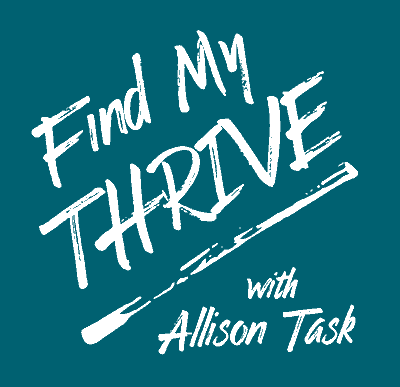





What a great in-depth interview! It’s very inspiring. I love that you mentioned being of service. It has always been a goal for my business to be of service to others. It had made my life much more rewarding than I could have imagined.
I’m so glad you liked reading this. As soon as I met Allison at NAPO2019, I knew that she was a blast, brilliant, and so interesting. I can only imagine how lucky her clients are to have someone this centered on giving and helping.
Wow, so fun learning more about Allison here! What an interesting journey, with so many twists and turns. I find it fascinating to hear about backgrounds. Most people have had a variety of experiences, all of which come together and make us smarter.
I’m right there with prioritizing health. Suddenly you reach an age where you need to invest in health if you want to keep going at a hearty pace!
I know, right? Allison’s whole background, and the notion of being different when we leave the forest, is worth really thinking about. (And my creaking joints agree — health is essential!)
Julie, this is a wonderful interview! I took that class at NAPO also and loved her energy. I’m so happy to know the back story and hear her talk about how she has arrived at this place in her life. I’ll be ordering these books and finding the podcast. Thank you so much for this.
And thank YOU for reading. And honestly, the credit goes to Allison, as I just asked the questions (well, and picked her to interview)!
Great interview – you’re making me sorry I missed NAPO2019! And now I have another great podcast to listen to on my long walks. What a fascinating life and person – very inspiring!
Thanks for reading, and yes, Allison’s life is fascinating, but I love that her telling of it makes us all look at the twists and turns that got us where we are now, and to where we are going!
Allison, thank you for telling your story, and Julie, thank you for sharing it! I think I need to come back and read it again – there’s just so much to absorb.
Julie,
Wow — what an honor it was to be featured on Paper Doll! Your questions made me think, really think, thank you for giving me this opportunity to share my store. It is humbling that it resonates with your community.
I think coaches and organizers are kindred spirits — we help people clear out the clutter, get unstuck so that they can reveal the version of themselves they want to be. I’ve always said a good coaching session is like a solid manicure, or a visit with the dental hygienist. We reveal.
Thank you so much for inviting me, Julie, and for your curiosity and commitment to your community.
Your kindred sister,
Allison
Thank YOU, Allison — for keeping Yiddish alive and teaching organizers how to make a shidduch, for wearing that cute dress to your presentation, for your books, and for sitting down to share your story!
I’m so glad you enjoyed the interview as much as I did, Janet. Allison has had a fascinating life, and she illustrates how all of us are more complex and intricate than we might initially assume.